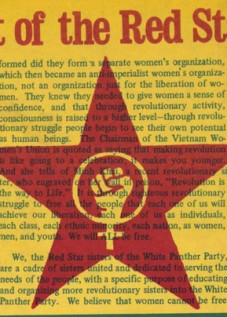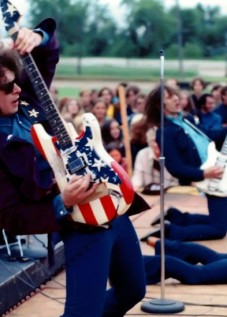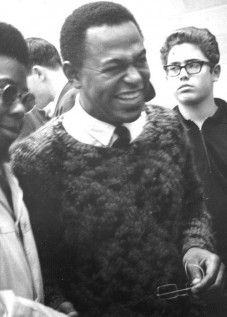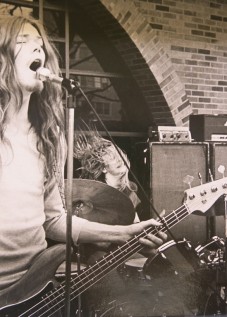Genie Parker
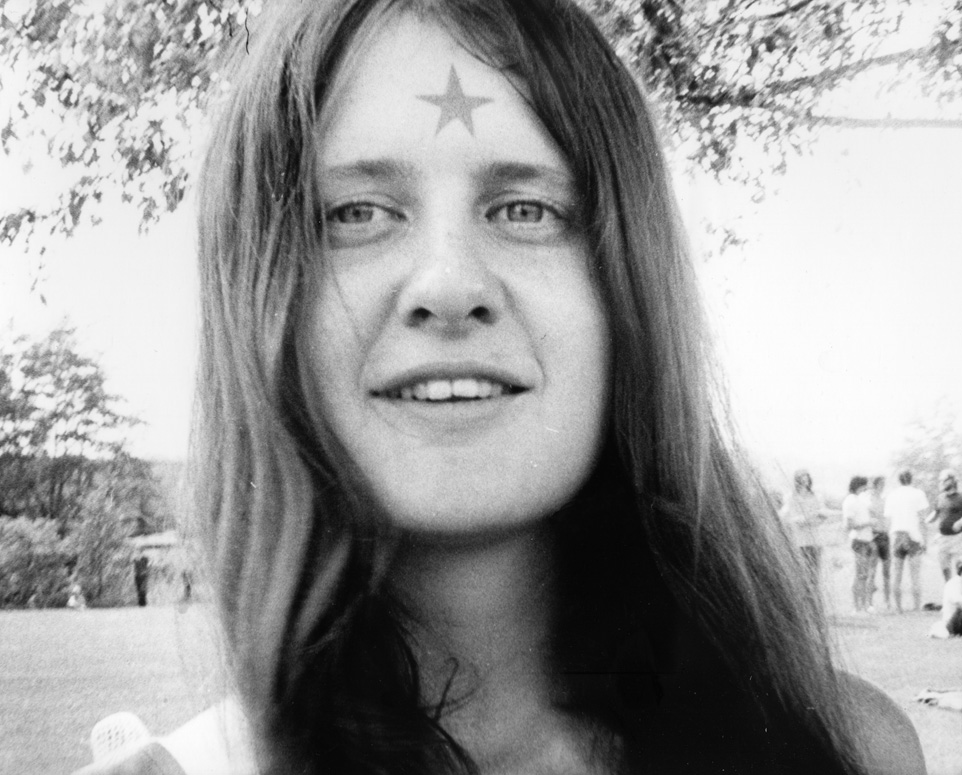
Genie Plamondon; Red Star Sister. photo by Leni Sinclair, 1970
Genie Parker was born Genie Johnson, in Vernon Texas, the daughter of a high ranking official in the US Air force. Being brought up in a military family, most of Genie’s childhood was spent in continuous travel; living for short times in Japan, France, Scotland, Germany and the Eastern United States. Genie left home at an early age and became a member of the collective beginning in the summer of 1967, just before the riots in Detroit. She was an organizer and activist, taking charge of communications and training between WPP chapters. She held a leadership position as “Minister of Foreign Affairs” in the WPP, and traveled overseas to Vietnam as a civilian observer and eyewitness. Genie led an exciting life in Panthers. She was an organizer of the Red Star Sisters and made trips to various WPP chapters around the country. Genie also visited Woodstock as part of the Movement Village to distribute leftist literature and spread information about the Free John Now movement.
The following selection is from an interview between Genie P. and Cary Loren.
CL: How did you your name become Parker?
GP: John helped me pick the last name Parker—my last name was Plamondon when I was married to Pun—but my nickname was Genie P… no one could pronounce Plamondon. My Grandmother told me we were related to Quanah Parker, [founder of the Native American Church Movement] and that was something you just didn’t talk about in Texas… so when I divorced Pun, John said, “you should call yourself Parker,” and so I did.
CL: So you ran away from home and crashed at the Workshop?
GP: At first I was living with somebody else at the workshop upstairs—I can’t even remember who—
CL: Carl Lundgren?
GP: Yes, Carl Lundgren. But he didn’t really live with us—he was staying at his Dad’s house at the time. It was very odd. There were weekend hippies—even Russ Gibb was known for wearing a wig on the weekends. A lot of people were like that—they were hippies on the weekends. But it ended quickly—Pun kind of swooped me away.
CL: What kind of work did you do at the store—or at the Grande?
GP: I made things. I’d string beads—hippie beads. We made Roach clips together. We’d get these old ornate silver spoons and cut the spoon part off—and we’d have the stem and we’d connect that to the alligator clip and wrap it with pretty colored threads. I still use one. They were really pretty, We sold a lot of them.
I remember painting the front of the Grande—we painted it to make it psychedelic. And this one time, Carl was there painting and he didn’t have his shirt on…and he had this long hair. So he was painting and had his back to the street—and I remember these guys came by in a car going hey Baby! They thought he was a girl—until he turned around and I think he had a mustache and we all ran inside to hide.
CL: How did the idea for the Red Star Sisters begin?
GP: I guess it started with me… One day I just drew a red star on my forehead. After I did that all the girls in the house went, WOW! I just love the way it looks—and so they did it too! I was a hippie—and every once in a while I’d do something like that…paint my face. I don’t know why–it just seemed like a thing to do. Who coined the name I don’t know.
CL Leni said it might’ve come from a communist group in Albania.
GP: That might’ve been it.
CL: who were the other women in the Red Star Sisterhood?
GP: There was me and Leni, Peggy, Bonnie— the bands [MC5 & Up] girlfriends, Becky and Sigrid… I can’t remember all the names.
CL: Were the Red Star Sisters the beginning of a feminist movement?
GP: When we started this, it was barely the beginning of it. Not everybody was into it.
When I got busted in Texas … there were a bunch of Red Star Sisters there. A White Panther chapter was down there… it was Tarrant County, Texas—and we were jailed in Dallas—but the chapter might’ve been in Fort Worth. I think it was Fort Worth.
CL: Why were you busted?
GP: Well they said it was marijuana, but we didn’t have any, so they planted it on us—took us to jail and they beat up the guys. We went out for a walk one time—and when we came back it was strange—it was very dead still and quiet. There was a guy at one end of the street in a flannel shirt and another guy at the opposite end in a flannel shirt—they were cops in plain-clothes. And so we went into the house—they come bursting in with shotguns. These cops were cruel. They’d take cigarette butts and put them out on our guy’s skin. And the girls were crying and getting all scared. I was just saying, “Try and calm down, everything will be Ok—there are people all over the world going through much worse than we are. This is isn’t the way people should treat each other—just stay calm.” But man, it was horrible, just terrible. Those cops were the most brutal I’ve seen. So that’s how I ended up in the Tarrant County jail.
CL: Who organized the Texas chapter?
GP: I can’t remember his name, but he was a well known music producer. Leni will remember his name. [Freddie Brooks]
CL: Do you remember how many chapters there were across the country?
GP: Oh I could never remember anything like that. I kept in contact with people, I wrote letters, I just don’t want it to sound like I was really good at it –and I sent out a little newsletter every once in a while about what was going on but I was never real good about being an organizer.
CL What other kinds of meetings did you have?
GP: Well, we had a Tribal Council-and I was one of the organizers, but I was horrible at that. I wish I’d taken the opportunity to have done more.
CL: What happened there?
GP: We started to talk about culture—and what does it mean—and how is it that we’re different. What made us special? And we went through all the cultural stuff—getting into healthy foods instead of packaged stuff. You are what you eat, became a phrase people used. There was the food co-op we began and the Children’s Community school—and that’s still running—and the food Co-op is still going.
CL What was the purpose of the community school?
GP: That was to give kids a real education. How to make a school interesting and allow kids to develop—to bring out their creativity.
CL: Can you tell me something about Ken Kelly?
GP: He was so charismatic. He was a big guy, like John except blonde. A great sense of humor.
CL: He was gay, right?
GP: Oh yeah, bigtime. Flaming! He didn’t live with us, but we were all close friends. He produced the Ann Arbor Argus—and he had a house with a bunch of people. Very creative, fun and supportive. He was a lot of fun—he wrote stories, a creative writer—you know how he died, right?
CL: No, tell me.
GP: It’s really sad. Oh, they arrested him for kiddie porn– and beat him up, and he was sent to a hospital. They said they found something on his computer. He denied it all the time but who knows… so they just beat him to death, and nobody could do anything about it. [He ended up in a coma, then died in a hospital]. It was in California—his sister was out there. He called me just a month or so before he died, I felt really close with Ken.
Hear a live interview with Genie P. at: AADL Freeing John
Tags: Genie Parker, Genie Plamondon, Interview, Red Star Sisters, White Panther Party



